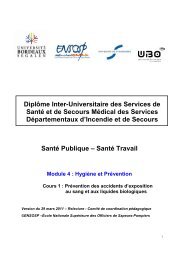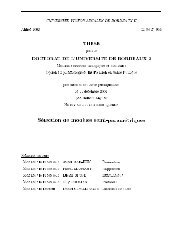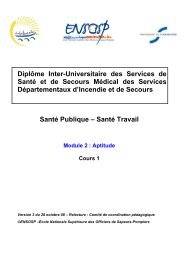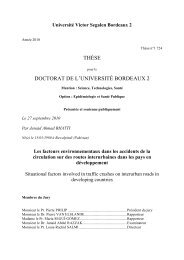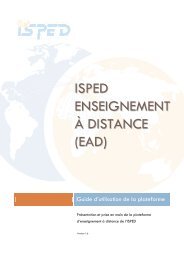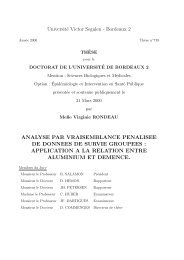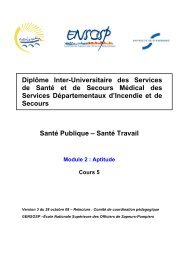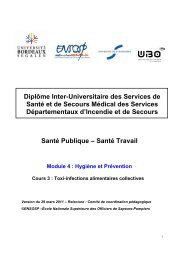2 MILLET ET AL.Downloaded By: [Mil<strong>le</strong>t, Xavier] At: 10:57 4 November 2009re<strong>le</strong>vance of such distinction in AD and have reported thatAD patients exhibited normal priming in identificationtasks and diminished priming performances in productiontasks (F<strong>le</strong>ischman et al., 2001; Gabrieli et al., 1999).Among the variety of tasks used to investigate implicitmemory in normal aging and AD, word-stem comp<strong>le</strong>tionpriming (Warrington & Weiskrantz, 1974) is incontestablythe most frequently used. In this task,participants are given a three-<strong>le</strong>tter beginning word-stemand are asked to evoke the first word that comes to mind.A priming effect is ref<strong>le</strong>cted by a higher probability tocomp<strong>le</strong>te the word stems with the previously studiedwords than with new (unstudied) words. According tothe perceptual–conceptual distinction, word-stemcomp<strong>le</strong>tion that is perceptually driven should be consideredas a perceptual priming task (Roediger et al., 1989)and thus should not be affected in AD. On the contrary,the identification–production distinction would predictimpaired word-stem comp<strong>le</strong>tion priming in AD since thetask requires production processes involving the competitionbetween multip<strong>le</strong> alternative responses (F<strong>le</strong>ischmanet al., 2001; Gabrieli et al., 1999). Regarding the availab<strong>le</strong>results, the number of studies reporting reducedword-stem comp<strong>le</strong>tion priming and the number ofstudies reporting no impairment appear approximatelyequiva<strong>le</strong>nt. In attempts to clarify such discrepancy, twometa-analyses assessed the integrity of word-stemcomp<strong>le</strong>tion priming in AD (Meiran & Jelicic, 1995;Russo & Spinn<strong>le</strong>r, 1994). Both concluded that wordstempriming is affected in AD. However, followingthese meta-analyses, numerous studies provided inconsistentresults (Arroyo-Anllo, Ingrand, Neau, Aireault,& Gil, 2004; Beauregard, Chertkow, Gold, & Bergman,2001; Cacho Gutierrez, Garcia Garcia, & FernandezCalvo, 2000; Camus et al., 2003; Car<strong>le</strong>simo et al., 1999;Deweer et al., 1994; Downes et al., 1996; F<strong>le</strong>ischmanet al., 1997; Koivisto, Portin, Seinela, & Rinne, 1998;Kuzis et al., 1999; Park et al., 1998; Pasquier, Grymonprez,Lebert, & Van der Linden, 2001).Methodological variations have been proposed toexplain the discrepancy of word-stem comp<strong>le</strong>tionpriming results in AD (F<strong>le</strong>ischman & Gabrieli, 1998). Inparticular, variability in encoding conditions could be agood candidate. Indeed, whi<strong>le</strong> word-stem comp<strong>le</strong>tionstudies in AD generally share equiva<strong>le</strong>nt implicit testphaseprocedures, the instructions delivered at encodingwere considerably different. The participants could berequested to respond whether the word contains a particular<strong>le</strong>tter (Gabrieli et al., 1994, 1999), to pronouncethe <strong>le</strong>tter corresponding to a numerical position (Scott,Wright, Rai, Extern-Smith, & Gardiner, 1991), or tocount the number of vowels (Car<strong>le</strong>simo et al., 1999) orsyllab<strong>le</strong>s (Kuzis et al., 1999) within the target word.Encoding phase instructions could also <strong>le</strong>ad participantsto read words aloud (Dick, Kean, & Sands, 1989;Downes et al., 1996; F<strong>le</strong>ischman et al., 1997; Gabrieli et al.,1999; Huberman, Moscovitch, & Freedman, 1994;Keane et al., 1991; Koivisto et al., 1998; LaVoie &Faulkner, 2008) or si<strong>le</strong>ntly (Beauregard et al., 2001) or torate on a sca<strong>le</strong> whether they liked or disliked a word orwhether the words are p<strong>le</strong>asant or unp<strong>le</strong>asant (Bäckman,Almkvist, Nyberg, & Andersson, 2000; Bondi &Kaszniak, 1991; Car<strong>le</strong>simo et al., 1998, 1999; F<strong>le</strong>ischmanet al., 1999; Pasquier et al., 2001; Randolph, 1991;Shimamura, Salmon, Squire, & Butters, 1987). Otherconditions putting emphasis on the meaning of the wordrequired participants to generate words from a givendefinition (F<strong>le</strong>ischman et al., 1999; F<strong>le</strong>ischman et al.,1997) or from a related word (Scott et al., 1991), or tocomp<strong>le</strong>te a sentence with sing<strong>le</strong> word endings (Grosse,Wilson, & Fox, 1990). Moreover, participants could alsobe requested to provide correct definition of words(Burke, Knight, & Partridge, 1994; Car<strong>le</strong>simo et al.,1999; McGeorge, Taylor, Della Sala, & Shanks, 2002;Partridge, Knight, & Feehan, 1990; Russo & Spinn<strong>le</strong>r,1994) or answer “yes or no” to questions relying onsemantic know<strong>le</strong>dge on a particular word (Beauregardet al., 2001; Gabrieli et al., 1994, 1999).As may be seen, the instructions given to participantsat the encoding phase are particularly heterogeneous. Itcan be hypothesized that the nature of processes thatoperate during encoding influences the magnitude oflater implicit retrieval in AD patients. The effect ofencoding manipulation on implicit memory tasks hasbeen widely debated with numerous studies concludingthat litt<strong>le</strong> or no effect of <strong>le</strong>vel of processing could bereported in comp<strong>le</strong>tion priming tasks (e.g., Challis,Velichkovsky, & Craik, 1996; Graf, Mand<strong>le</strong>r, & Haden,1982; Roediger, Weldon, Stad<strong>le</strong>r, & Rieg<strong>le</strong>r, 1992).Some studies in AD reported similar results (Beauregardet al., 2001; Burke et al., 1994; F<strong>le</strong>ischman et al., 1999;F<strong>le</strong>ischman et al., 1997; Russo & Spinn<strong>le</strong>r, 1994; Scott et al.,1991). On the other hand, a significant effect of conceptualself-generation processes has been repeatedlyreported on word-fragment (Gardiner, 1988; Schwartz,1989) and word-stem (Bassili, Smith, & MacLeod, 1989;Car<strong>le</strong>simo, 1994; Car<strong>le</strong>simo et al., 1999) comp<strong>le</strong>tiontasks. Thus, word-stem comp<strong>le</strong>tion priming could alsobe regarded as a conceptual priming task. Moreover,when meta-analyses on implicit memory tasks includingword-stem comp<strong>le</strong>tion priming consider encodingmanipulation, a constant advantage of deep over shallowprocessing is reported (Brown & Mitchell, 1994;Challis & Brodbeck, 1992). In AD, some studies evidencingnormal word-stem comp<strong>le</strong>tion priming performancesfollowing semantic generation supported the conclusionthat an elaborate conceptual encoding condition may benecessary for AD patients to facilitate word-stem comp<strong>le</strong>tionpriming (Grosse et al., 1990; Partridge et al.,1990). Moreover, Maki and Knopman (1996) evidencedthat AD patients exhibited intact generation primingonly in the situation involving elaborative conceptualgeneration of items whatever the perceptual or conceptualnature of the retrieval procedure. The authors concludedfor the necessity of reinstating at retrieval thespecific operation initially required at encoding phase toimprove priming performances in AD, consistently withthe latest model by Roediger, Gallo, and Geraci (2002)providing a more procedural approach of memory.Thus, it can be hypothesized that considering the natureof encoding condition could contribute to clarify wordstemcomp<strong>le</strong>tion priming performances in AD.
WORD-STEM COMPLETION PRIMING IN AD 3Downloaded By: [Mil<strong>le</strong>t, Xavier] At: 10:57 4 November 2009The present work was conducted to determinewhether discrepant word-stem comp<strong>le</strong>tion resultsobserved in AD could be due to the heterogeneity of theencoding conditions used. The meta-analyses availab<strong>le</strong>in AD (Meiran & Jelicic, 1995; Russo & Spinn<strong>le</strong>r, 1994)did not consider this variab<strong>le</strong>. Therefore, we made anupdate of the published studies reporting AD patients’performances on word-stem comp<strong>le</strong>tion tasks and conducteda meta-analysis on the poo<strong>le</strong>d data. The studiesincluded in the meta-analysis involved different encodingconditions. More precisely, we were interested indetermining first whether AD patients manifest significantpriming effect; second, whether the magnitude ofpriming is similar in the AD patients and the elderly controlgroups; and finally, whether encoding conditionsinfluence the magnitude of word-stem comp<strong>le</strong>tion primingdifferences between AD patients and elderly controlsgroups.METHODLiterature search, meta-analysis criteria,and studies eligibilityStudies were se<strong>le</strong>cted by means of a literature search inPsycLit and MedLine using the keywords “word stemcomp<strong>le</strong>tion,” all crossed with “Alzheimer” or “dementia.”Tit<strong>le</strong>s and abstracts of the prese<strong>le</strong>cted artic<strong>le</strong>s werefirst reviewed. A total of 44 studies were se<strong>le</strong>cted bymeans of the computerized search strategy. A total of 32additional studies were se<strong>le</strong>cted by hand-searching referencescited in reference lists of these artic<strong>le</strong>s. The full textversion of the se<strong>le</strong>cted artic<strong>le</strong>s was examined to assessre<strong>le</strong>vance to the topic of the research. Among these studies,40 studies fulfil<strong>le</strong>d our inclusion criteria, but datawere missing for 26 studies. We contacted authors whendata were missing. Authors of 15 studies responded tothe information request but among these only 4 provideddata that could be used in statistical analyses. Studies forwhich adequate information was provided or could beobtained from the authors were systematically includedin the meta-analysis; these are identified in the References.Computerized and manual searches were comp<strong>le</strong>tedon 31 May 2009.Research artic<strong>le</strong>s were considered for inclusion if theycomprised a samp<strong>le</strong> of elderly controls and a samp<strong>le</strong> ofpatients diagnosed with probab<strong>le</strong> AD. Furthermore,studies were se<strong>le</strong>cted for inclusion if they used item primingtasks with three-<strong>le</strong>tter stems. Studies were excludedfrom the analysis if the experimental design comprisedone of the following study variab<strong>le</strong>s: (a) drug administration,(b) associative priming, (c) nonword and two-<strong>le</strong>tterstems comp<strong>le</strong>tion, or (d) the process dissociation procedure(Jacoby, 1991). The study conducted by Can et al.(2006) was not se<strong>le</strong>cted because the artic<strong>le</strong> is written inTurkish, and none of the coauthors of our study wasab<strong>le</strong> to properly read and extract re<strong>le</strong>vant information.Data extraction was undertaken by one reviewer(X.M.) and verified by another reviewer (M.L.G.). Foreach study, samp<strong>le</strong> sizes, means for age, Mini-MentalState Examination (MMSE) score (Folstein, Folstein, &McHugh, 1975), and years of education were recordedfor the AD patients and elderly control groups. Thepatients were diagnosed as suffering AD according toNational Institute of Neurological and CommunicativeDisorders and Stroke–Alzheimer’s Disease and RelatedDisorders Association (NINCDS-ADRDA) criteria(McKahn et al., 1984) except in the studies conducted byDownes et al. (1996) and Partridge et al. (1990) where noclinical classification for AD diagnosis is specified.Means and standard deviations of priming scores andrates of comp<strong>le</strong>tion of studied and unstudied words wereconsidered. Graphic data presented in Salmon et al.’s(1988) study were transformed into numerical data.Meta-analysisMeta-analysis is a quantitative statistical method thathas been created to improve literature review. Thismethod is based on the effect size, a standardized statisticthat quantifies the magnitude of an effect. Two typesof metrics are generally used to estimate the effect size.The r-family ref<strong>le</strong>cts the degree of correlation betweentwo variab<strong>le</strong>s whereas the d-family characterizes themean difference between these two variab<strong>le</strong>s. In thisstudy, means and standard differences were used toestimate d effect sizes. The effect sizes and 95% confidenceintervals (CIs) were calculated for each experiment.To determine whether there was a significant effect size,we computed a CI for the mean effect size. In an attemptto provide a qualitative interpretation of the effect sizes,the magnitude of the effect sizes was evaluated accordingto Cohen’s (1988) standards: Effect size was consideredtrivial if lower than 0.2, small between 0.2 and 0.5, moderatebetween 0.5 and 0.8 and strong if higher than 0.8.A consensual method to assess the extent of heterogeneitybetween the studies (excess of variability due tochance, sampling errors . . .) is the application of a statisticaltest known as the Cochrane chi-square (homogeneitystatistic Q). The Q statistic was calculated to quantify thedegree to which the effect sizes contributing to the meaneffect can be regarded as homogeneous. Significantestimate of Q suggests the existence of substantive differencesbetween the studies, whereas nonsignificant estimateof Q suggests no substantive differences between thestudies. Because of the low sensitivity of the test (e.g.,Hardy & Thomson, 1998), significance was defined a priorifor a p-value greater than .10 suggesting a lack ofhomogeneity. Based on the extent of heterogeneity calculated,different models were considered to estimate theeffect sizes (Berlin, Laird, Sacks, & Chalmers, 1989).When no significant estimate of Q was evidenced, a fixedeffectsmodel was employed using the inverse variancemethod; a random-effects model based on the method ofDerSimonian and Laird (1986) was used when significantheterogeneity was encountered. Whereas the fixed-effectsmodel takes into account variation within studies, the random-effectsmodel is recommended when a high source ofheterogeneity is encountered because it takes into accountrandom variations both within and between studies.
- Page 1 and 2:
Université Bordeaux 2 - Victor Seg
- Page 3 and 4:
ABSTRACTResidual cognitive abilitie
- Page 5 and 6: visites sur site (souviens toi la S
- Page 7 and 8: « Dans le parc du château, il y a
- Page 9 and 10: CHAPITRE II : PARTIE EXPERIMENTALE.
- Page 11 and 12: CHAPITRE I : INTRODUCTION THEORIQUE
- Page 13 and 14: La mort sociale est une figure réc
- Page 15 and 16: améliorer ce rappel lorsqu’une a
- Page 17 and 18: traiter une information pertinente
- Page 19 and 20: exécutives soient manifestes (Hodg
- Page 21 and 22: « représentationnel » de mémoir
- Page 23 and 24: 3.2.1. Capacités d'amorçageLe ph
- Page 27 and 28: que les patients pré-diagnostiqué
- Page 30 and 31: traitements dirigés par les concep
- Page 32 and 33: complexes aux différents évèneme
- Page 34 and 35: Enfin, la capacité des patients MA
- Page 36 and 37: 4.2.2. Facteurs favorisant la const
- Page 38 and 39: et al., 2007 ; Wilson et al., 2000)
- Page 40 and 41: la maladie. En effet, dans cette é
- Page 42 and 43: dix minutes. D’autres études sug
- Page 44 and 45: JOURNAL OF CLINICAL AND EXPERIMENTA
- Page 46 and 47: Downloaded By: [EBSCOHost EJS Conte
- Page 48 and 49: Downloaded By: [EBSCOHost EJS Conte
- Page 50 and 51: 834 MILLET ET AL.Downloaded By: [EB
- Page 52 and 53: 2. Influence des niveaux de traitem
- Page 54 and 55: l’effet d’amorçage estimé che
- Page 58 and 59: 4 MILLET ET AL.Downloaded By: [Mill
- Page 60 and 61: 6 MILLET ET AL.Downloaded By: [Mill
- Page 62 and 63: 8 MILLET ET AL.Downloaded By: [Mill
- Page 64 and 65: 10 MILLET ET AL.Downloaded By: [Mil
- Page 66 and 67: 3. Influence du sexe sur les perfor
- Page 68 and 69: dans les tâches de manipulation ac
- Page 70 and 71: 784 X. Millet et al. / Archives of
- Page 73 and 74: Verbal short-term memory measuresWe
- Page 75 and 76: X. Millet et al. / Archives of Clin
- Page 77 and 78: des patients MA évalués dans une
- Page 79 and 80: l'évaluation du caractère plaisan
- Page 81 and 82: de la phase de test, les opération
- Page 83 and 84: l’activité du cortex frontal non
- Page 85 and 86: stratégies visuo-spatiales de natu
- Page 87 and 88: fonctionnement quotidien des patien
- Page 89 and 90: 4.3. Méthodes de revalidation cogn
- Page 91 and 92: communes à ces différents program
- Page 93 and 94: phase d’apprentissage. Toutefois,
- Page 95 and 96: des photographies de visages et des
- Page 97 and 98: Ainsi, à partir de janvier 2010, c
- Page 99 and 100: souvent été rapportés à partir
- Page 101 and 102: 5. Conclusion généraleCompte tenu
- Page 103 and 104: BIBLIOGRAPHIE102
- Page 105 and 106: York: Cambridge University Press.Ba
- Page 107 and 108:
Multidimensional measures of person
- Page 109 and 110:
Fox, N.C., Warrington, E.K., Freebo
- Page 111 and 112:
Procedural memory in patients with
- Page 113 and 114:
625-632). London: Academic Press.La
- Page 115 and 116:
Patterson, K., Graham, N., & Hodges
- Page 117 and 118:
test: role of aging and divided att
- Page 119 and 120:
ANNEXES118
- Page 121 and 122:
• Photographies des visages distr
- Page 123 and 124:
Epreuve de titresCe travail de thè



